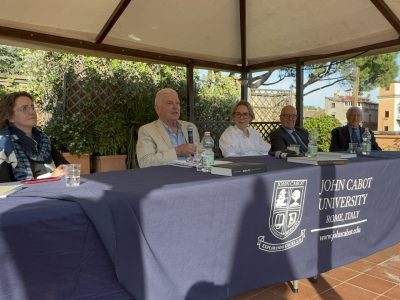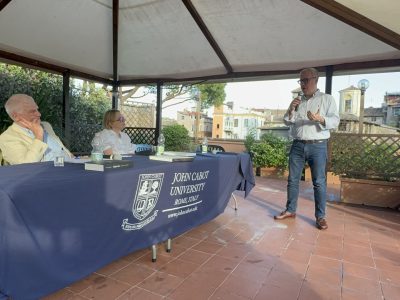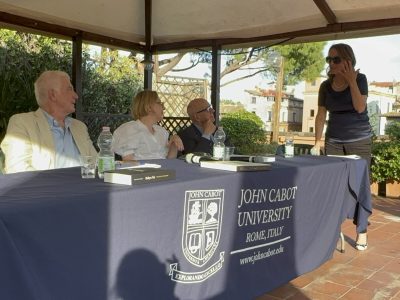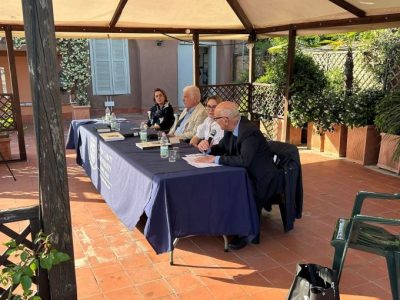Video: Paul Robert Magocsci speaks at John Cabot University in Rome
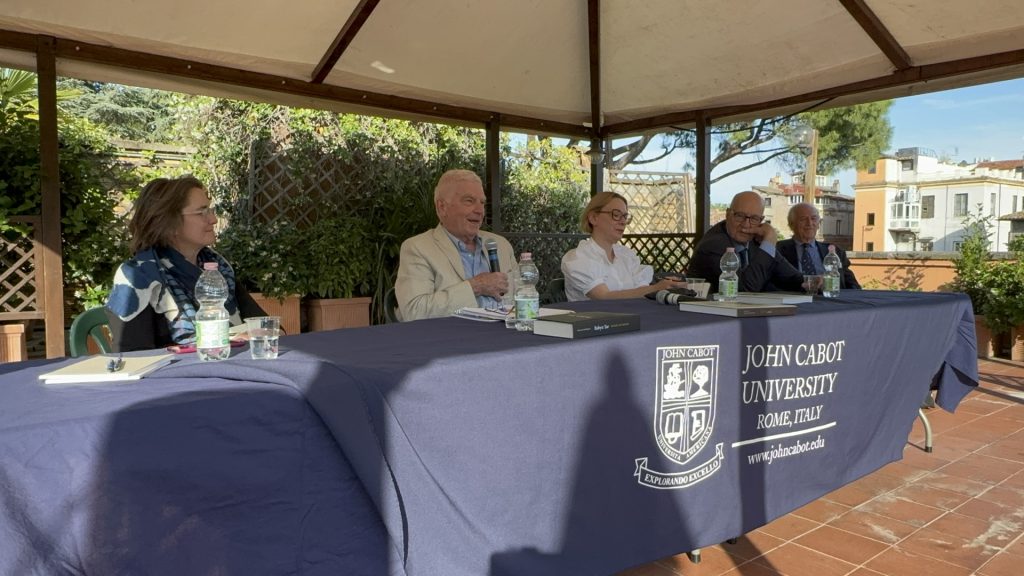
UJE Board Member Paul Robert Magocsi appeared at John Cabot University in Rome on 4 June 2024 at an event presented by the university’s president Franco Pavoncello, and moderated by Federigo Argentieri, Director of the Guarini Institute for Public Affairs. The well-attended event, held on John Cabot’s panoramic Secchia Terrace, fostered a lively discussion with students, faculty, and members of the general public. Below is a report of Magocsi’s presentation, which is part of a longer article published on the university’s website.

Paul Robert Magocsi and the Massacre of Babyn Yar
Historian Paul Robert Magocsi of the University of Toronto joined the JCU community for the second event on June 4. Magocsi is the co-editor and co-author of two books, the first of which came out in conjunction with the commemoration of the 75th anniversary of the tragedy of Babyn Yar, where over 33,000 Jews were murdered by the Nazis. The first, written with Yohanan Petrovsky-Shtern, was Jews and Ukrainians: A Millennium of Co-Existence (University of Toronto Press, 2016), an overview of Jews and Ukrainians aimed at a general public. The second, co-edited with Vladislav Hrynevych Sr., was titled Babyn Yar: History and Memory (University of Toronto Press, 2023). The volume addresses the “Holocaust by Bullets” that occurred in Kyïv in 1941 in various articles and memory pieces and is in some ways an attempt to reappropriate what Soviet propaganda had distorted for many years.
The publication of both books was supported by the Ukrainian Jewish Encounter (UJE), a Canadian charitable nonprofit organization, established in 2008 with the goal of strengthening mutual comprehension and solidarity between Ukrainians and Jews. Magocsi is a UJE board member.
JCU President Franco Pavoncello welcomed the guests and spoke on the importance of understanding the Jewish presence in Central and Eastern Europe’s cultural development and of remembering the tragedy of Babyn Yar. After Director Argentieri invited Magocsi to say a few words about the books, a lively discussion ensued, with many questions from the audience as well. The first question, posed by Guarini Institute advisor Amy Rosenthal, was about the subtitle of the first book. She questioned the word coexistence, as in her understanding the relationship might better be described as conflictual. Magocsi insisted on acknowledging that Jews have lived on Ukrainian territory for two millennia, but whether we go back thousands of years or to the 15-17th century when there was a real Jewish presence in medieval Kievan Rus’, there is clearly more coexistence than conflict (only 18-20 years out of 450, according to his calculations).
Jewish and Ukrainian Coexistence
The idea of coexistence was an undercurrent throughout the Q&A session, with distinguished Ukrainian studies Professor Giovanna Brogi providing the example of the marketplace as an apt illustration, and pointing out that in 17th century literature, for example, one finds a general xenophobia, not specifically anti-Jewish sentiments. Magocsi mentioned that, in fact, real conflict usually came from outside factors; for example, the enemy of the Haidamaks in the 18th century, and even of the earlier Khmelnytsky uprising, were the Catholic Polish ruling class.
The idea of coexistence surfaced again in response to Sapienza University of Rome Professor Olena Ponomareva’s question about antisemitism in Ukraine today. Magocsi mentioned the unimportance of Ukrainian President Volodymyr Zelensky’s Jewish heritage when he was democratically elected in a landslide in 2019. He also scoffed at the believability of Russia’s early disinformation campaigns about antisemitism in Ukraine as a basis for the current conflict. Nataliya Kudryk, a journalist at Radio Free Europe-Radio Liberty, along with writer Massimiliano Di Pasquale, lamented the spread of disinformation here in Italy as well.
Naturally, attention was paid to the current conflict, but mostly in terms of Ukrainian national identity, which Magocsi noted was a relatively new focus for ethnic Ukrainians. He spoke of one of the few positives of Soviet culture being the de-emphasis of ethnic differences. Although, as Luigi Sergio Germani (Director of The Gino Germani Institute) pointed out, Soviet leaders such as Nikita Kruschev and Mikhail Gorbachev had institutionalized antisemitism, Magocsi clarified that it was equal opportunity repression at the time.
The event ended with a catered reception where conversations continued to take place.
Rori Sebach
Video: Paul Robert Magocsi, Franco Pavoncello, Federigo Argentieri, John Cabot University, Rome, 4 June 2024







